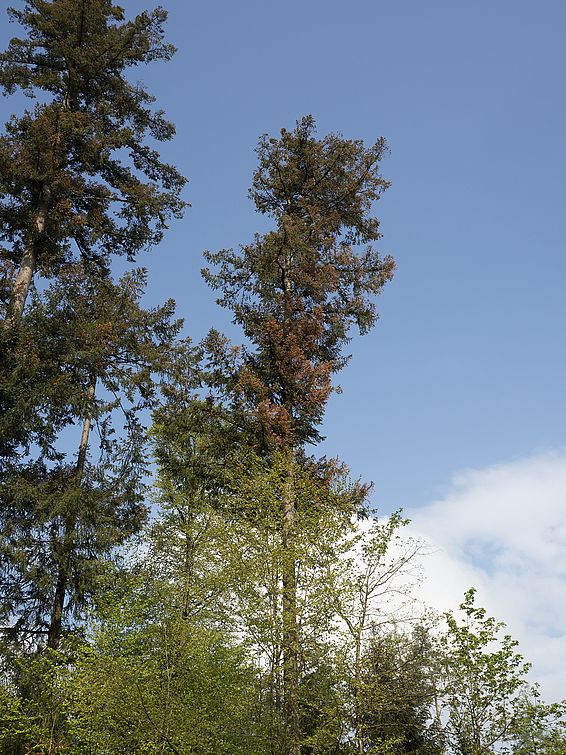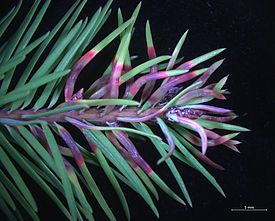31.10.2023 | Simon Blaser, Beate Kittl | WSL News
The Douglas firs in Switzerland had a bad year: starting in mid-April 2023, foresters noticed conspicuously red-coloured needles. Investigations show that this is probably frost damage. Moreover, with the first discovery of invasive gall midges from North America in summer 2022, the list of Douglas fir pests has been extended further. This is reported in the new issue of Waldschutz Aktuell.
The Douglas fir from North America is considered an important future tree species for Swiss silviculture, as it tolerates drought better than local conifers. However, it has been shown that it is quite susceptible to frost in spring. This spring, Forest Protection Switzerland received numerous reports of conspicuous reddening of the needles (Fig. 1) of Douglas firs. This affected pole wood and old-growth stands all over the Central Plateau, often in large areas.
Researchers from Forest Protection Switzerland examined infested shoots and were able to rule out pathogenic fungi as the cause. Almost half of the Douglas firs examined were infested with the spruce bark beetle (Ips typographus), but it was unable to reproduce further in the Douglas fir wood. Thus, frost in the months of February and March is the most likely cause of needle reddening, which mainly occurred on the youngest shoots. In particular, the second half of February 2023 was unusually warm. At the end of the month, however, there was a sudden cold snap. This could have caused so-called alternating frost damage. Previous experience with pronounced frost damage to conifers suggests that the damaged Douglas firs will recover in the next few years.
New enemy discovered
In 2022, Forest Protection Switzerland discovered Douglas-fir needle midges of the genus Contarinia for the first time in the canton of Basel-Landschaft. Subsequent monitoring programmes showed that the invasive needle midges from North America are already widespread in the north of Switzerland. Their occurrence in Europe has been known since 2015 and was discovered simultaneously in Belgium, France and the Netherlands, and then in Germany the following year.
Adult Douglas fir needle midges hatch in late spring when the Douglas fir buds open. They lay their eggs on freshly sprouted needles. The hatching larvae eat through the needles, triggering the formation of characteristic galls, which leads to thickening, deformation and conspicuous discolouration of the needles (Figure 2). This reduces the needle surface and causes the needles to drop prematurely, which can negatively affect the growth of the Douglas fir. In the case of severe, perennial infestations, entire shoots may die.
In the region of origin North America, the damage caused by needle midges is particularly pronounced when they occur together with other harmful organisms. The Swiss needle cast (Nothophaeocryptopus gaeumannii), a fungus, and the Cooley spruce gall adelgid (Adelges cooleyi) are already established in Switzerland and were frequently found together with needle midges during last year's monitoring programme. "We assume that Douglas fir needle midges will continue to spread in Switzerland and will probably be able to establish themselves in all areas where Douglas fir is cultivated," says Simon Blaser of Forest Protection Switzerland. In addition, there is the steadily increasing stress caused by rising temperatures and more frequent dry phases. It remains to be seen whether the Douglas fir passes the suitability test as a tree for the future for Switzerland.
Contact
Publication
Blaser S., Dubach V., Stroheker S., Beenken L., Queloz V. (2023) Douglasie im Stress. Waldschutz aktuell: Vol. 2/2023. Birmensdorf: Waldschutz Schweiz; WSL. 5 p. Institutional Repository DORA
Links and documents
Copyright
WSL and SLF provide image and sound material free of charge for use in the context of press contributions in connection with this media release. The transfer of this material to image, sound and/or video databases and the sale of the material by third parties are not permitted.

